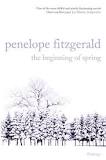Penelope Fitzgerald, late careers and low pensions
For my book group (all-male – apparently book groups are powerful examples of our homophiliac tendencies, even more so for women than men) last night we had read Penelope Fitzgerald’s The Beginning of Spring. Everyone had enjoyed it, laughed at it, and marvelled at Fitzgerald’s apparent capacity to get under the skin of Russian society without ever having been there. (None of us knew much about Russia, but the descriptions were thoroughly convincing to us and to the critics who put the novel on the Booker shortlist.)
Fitzgerald had a remarkable personal history. She was the granddaughter of the Bishop of Lincoln and grew up surrounded by uncles and aunts of diverse talents. She married Desmond, a barrister who never recovered from his war experiences and became an alcoholic. This meant that the family – they had 3 children – slid steadily down the social scale, from Hampstead to a damp cottage in Suffolk, then on to a houseboat which twice sank, and eventually to a council flat in Ponders Green.
Fitzgerald only took up writing books at the age of 58. Her first story was written to amuse her dying husband. She went on to publish four novels which drew heavily on her own life, e.g. The Bookshop which draws on her experience of working in one in Southwold, and then four more which were built up from careful research into more or less esoteric subjects. The Beginning of Spring is about an expatriate Brit running a printing firm in Moscow in the early part of the C20.
Fitzgerald gained eventual recognition, winning several literary prizes, but her unconventional route to very late authorship posed problems for committees and critics. As Jenny Turner puts it in her LRB review of Hermione Lee’s biography:
“A ‘favourite aunt’, ‘a jam-making grandmother’, ‘Pooterish’, ‘distrait’: this is the sort of thing people wrote about the figure Fitzgerald presented, finding a dissonance between the performance and the craft and brains of the books. It’s tricky enough, dealing with these women writers, but one who’s old as well, and didn’t start publishing until she was nearly sixty: it’s difficult to compute.”
What makes Fitzgerald so relevant to the PP is that she is a fairly extreme instance of a woman whose career flowers late, in her case as in so many others after bringing up children. It’s a striking model of something we should get used to and encourage – not necessarily as the ideal route, but as an option.
On the same day, we heard about Labour’s proposals that lower earners might be included in the auto-enrolment system for pensions. Rachel Reeves, the shadow Secretary for Work and Pensions has suggested that the level for auto-enrolment be lowered from its current £10000 to the Lower Earnings Limit for National Insurance, which is currently just under £6000.
The great bulk of the beneficiaries of such a move would be women, of course. It would do something to recognise that for many people there is no steady ‘career’, with more or less continuous employment. This in itself is no bad thing; many of us would benefit from a more variegated pattern of work. But it should not carry the penalty that it does. I wonder if Fitzgerald might have fallen into exactly the category of people that these proposals would help.
PS I use ‘homophiliac’ above to mean seeking out the same. The dictionary, however, equates it with homosexual, which seems to me perverse (as a definition). But I couldn’t find the term I was looking for, if it exists.
